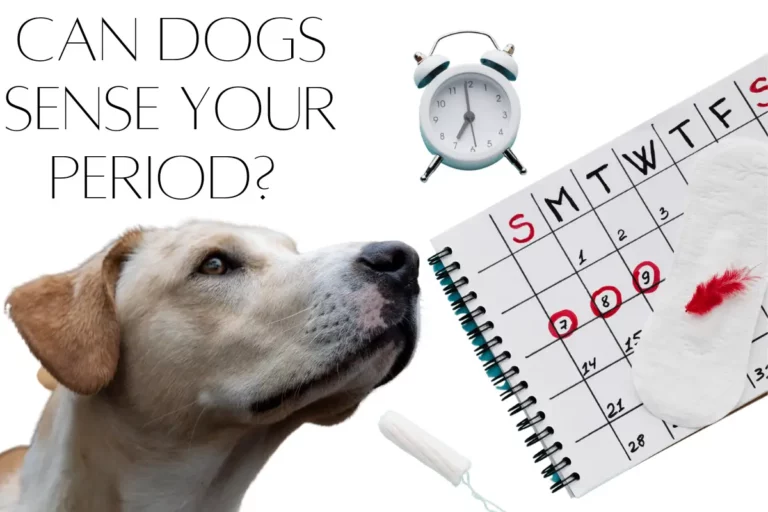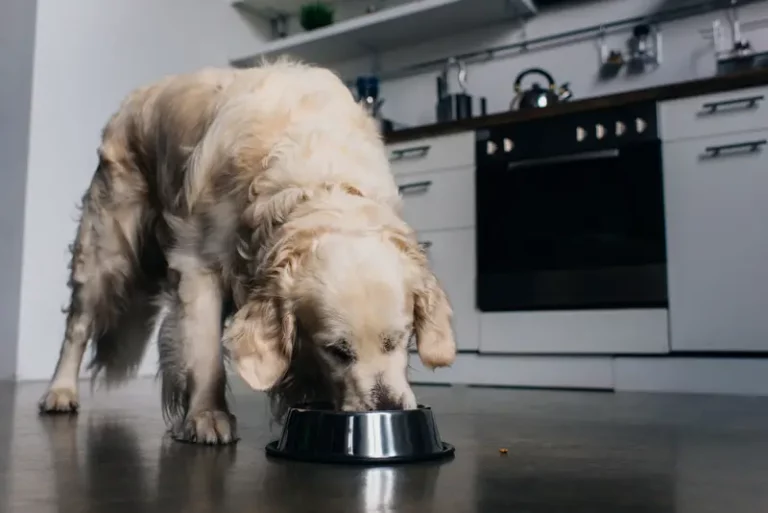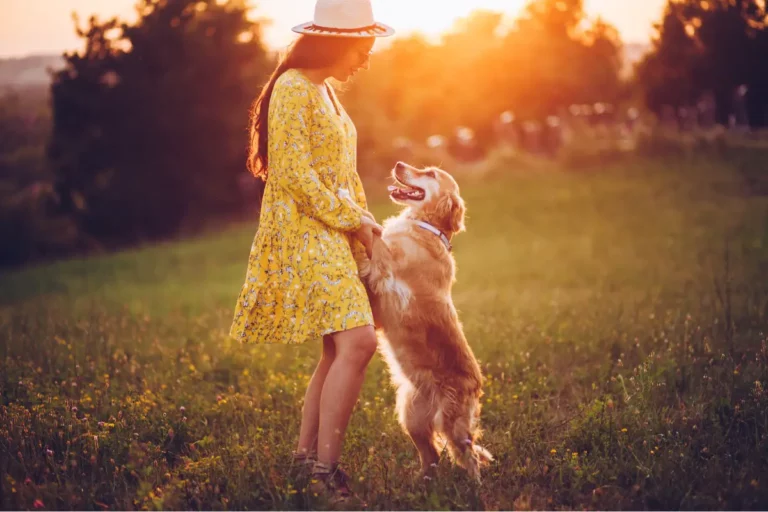Your Dog’s Sleeping Positions and What They Mean
Is your pup always curling up next to you in bed? Ever wonder why your pup keeps changing spots when they sleep? Is your dog always where you’re not?
A dogs’ sleeping habits can be a strange and funny thing to observe.
In this article, we’ll answer the following questions with detailed explanation of the biological mechanisms at play:
- Why does my dog sleep curled up right next to me?
- Why does my dog move from spot to spot while sleeping?
- Why does my dog sleep at my feet instead of next to me?
Key takeaways
Dogs’ sleeping positions can reveal their comfort, personality, and health.
The “Lion Pose” indicates a resting but alert dog.
“Side Sleepers” show a high level of trust and comfort.
The “Superman Pose” is common in playful and high-energy dogs.
The “Donut” position can signify a need for security or warmth.
“On the Back, Paws Up” suggests a dog is very comfortable and is cooling off.
“Crazy Legs” sleepers are deeply relaxed and have strong bonds with owners.
Changes in sleeping position can signal discomfort or illness.
Each dog is unique, and context is key to understanding their behavior.
Why does my dog sleep curled up right next to me?
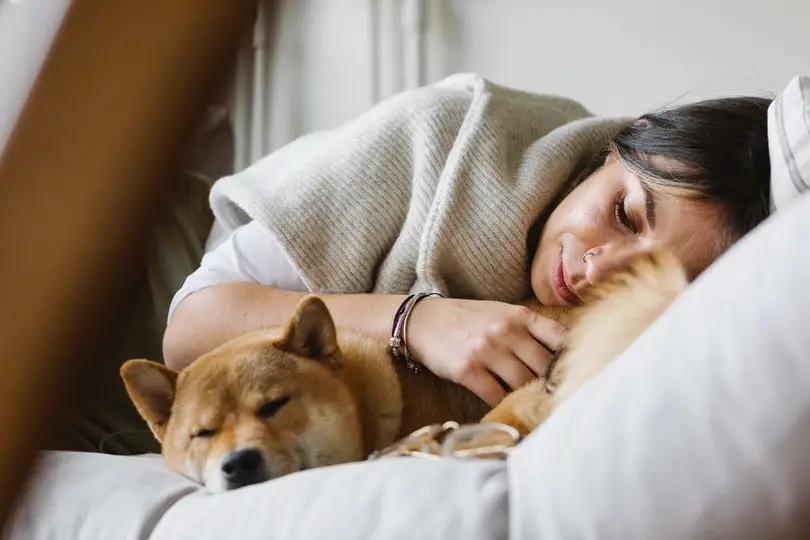
Snuggling up to you in your bed—it’s one of the many endearing habits that our canine companions partake in. But why does your pup sleep with their body curled up next to you? We explore some of the likely explanations for this behavior. From instinctive behavior to attempting to regulate temperature.
It’s A Sign of Affection.
Dogs curling up into your side is often a sign of affection. By curling up next to you in bed, they’re seeking out your warmth and scent, as well as feeling secure enough to relax with you in such an intimate manner. Feeling love and comfort from a human companion is important for our canine companions, so this could be why yours insists on sleeping close to you every night.
Your Dog is Seeking Safety and Comfort in Your Company.
When a dog curls up next to you, it might be because they want to feel safe and secure near someone that gives them unconditional love. By curling up next to you in bed, dogs are seeking out your warmth and scent, as well as feeling confident enough to relax with you in such an intimate manner. Your pup needs a sense of comfort and assurance that you’ll be there for them no matter what.
Your Dog is Claiming You as Their Alpha or Pack Leader.
In the dog world, there is an order or hierarchy within a pack of dogs. Dogs tend to lay or sleep near the one they see as the alpha or leader in their pack, and they view you as their leader. By sleeping close to you, your pup is reinforcing its bond with you, giving itself a sense of security and protection in its environment.
They are Demonstrating Dominance Over You or Others in the Home.
Dogs are always trying to show dominance and if your pup is curling up or sleeping very close to you, it could be trying to show that it’s the alpha leader in your pack. By sleeping as close as possible to its “leader,” the pup can demonstrate that it is comfortable in its position and does not feel threatened by others within your home.
There Could be Something More Sinister Going on Such as Stress or Anxiety.
Sometimes your pup’s closeness could mean that something is wrong. If it starts showing signs of insecurity, cowering, or becoming clingy, they might be under emotional distress due to recent events such as moving to a new home or the addition or sudden absence of a family member. Sleeping curled up close to you might be their way of looking for assurance and safety in the midst of an uncertain situation. In these cases, training sessions can help your pup learn better social skills and achieve equilibrium by reassuring them that everything is alright.
Why does my dog move from spot to spot while sleeping?

Have you ever noticed that your pup is moving from one spot to another while they sleep? This behavior may appear odd, but it is actually quite common in canines and has a few reasons behind it. In this article, we will explain why your dog moves around so much during their sleep and the biological mechanisms at play.
Exploring the Thermal Benefits of Moving Around.
One of the primary explanations for why dogs keep moving when they sleep is that it helps them keep body heat. Dogs can regulate their own temperature by adjusting their sleeping patterns and monitoring the environment. As such, they may be more likely to move around if they feel too hot or cold. This way, they can explore different spots to find a place with the ideal room temperature and settle down in it.
Breaking Up Long Resting Periods for Breaks.
Also, to temperature regulation, another reason for why dogs change positions when they sleep is that it helps them break up long periods of rest. Many experts believe this behavior is instinctive, so that animals can check their environment for potential threats during periods of lower alertness. By moving around from time to time, dogs are better able to respond if anything unexpected occurs and save themselves from danger.
Preserving Mental Energy When Exhausted.
Dogs also conserve mental energy when sleeping and resting by limiting movements that need conscious effort. By stretching and changing positions, dogs can reduce their mental stress that occurs when hunting and running in the wild. This is particularly beneficial when dogs are exhausted after a long day of playing or chasing prey. Moving around while asleep allows their bodies to become more comfortable while they rest, preserving what little remaining energy they may have until they wake up refreshed and ready to face another day!
Acting on Anxiety or Stress-induced Restlessness.
Apart from physical comfort, restlessness while sleeping can be a sign of psychological discomfort. Dogs may respond to stress and anxiety by shifting around in their sleep due to a very primitive defensive mechanism—an evolutionary habit that prevents predators from being able to detect their presence more easily. By changing sleeping positions, dogs mentally prepare themselves for action if a potentially dangerous situation arises as they enter and exit the deeper stages of sleep.
Adapting to Changing Sleep Patterns with Ageing.
As dogs age, changes to their sleep patterns can occur too. Older dogs are likely to develop different sleeping habits due to physical limitations that can lead to a reduced amount of time spent in deep sleep. Senior pups may also have difficulty transitioning into and out of restorative stages of sleep, causing them to shift around more as they drift in and out of consciousness.
Why does my dog sleep at my feet instead of next to me?
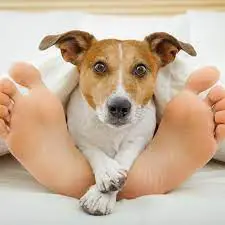
If you find yourself wondering why your pup loves to sleep at your feet rather than curled up next to you on the bed or couch, you’re not alone. There is a simple explanation for why your fur baby insists on sleeping at your feet, and it actually has plenty of benefits for both of you!
Comfort and Feeling Protected
Believe it or not, there are a few reasons why your dog may prefer to snooze at your feet rather than next to you. For starters, dogs love feeling comforted and secure, and sleeping at their owners’ feet provides them with that! Snuggling up against your legs creates a feeling of safety, allowing your pup to relax and drift off knowing they have their owner nearby.
The Fallout from an Ancestral Pack History
Another major reason why your pup might prefer to sleep at your feet over lying next to you is related to their ancestral pack history. In the wild, lower ranking wolves opted to huddle near their alpha in an effort to stay safe – and that same sentiment is certainly seen in our domesticated four-legged friends as well. By sleeping at our feet, they’re exhibiting classic pack behaviour which makes them feel comfortable and secure.
Following Routine and Familiar Surroundings
Dogs are creatures of habit and ones who belong to a family unit, like your pup does, want the consistency of routine and familiarity when it comes to sleeping. The security provided from being near their owner helps them with relaxation which in turn promotes quality sleep and positive mental wellbeing. Sticking to the same positions or locations at night each day will help them feel more comfortable as well.
Maintaining a Close Social Bond
Dogs are social animals, so it’s important for them to stay connected with their family unit. That’s why they often choose to sleep at the feet of their owners- they want to be as close as possible while still maintaining a feeling of trust and security. By sleeping near your feet, your pup is able to keep an eye on any potential danger while still being close enough to you that they feel safe and protected. It’s this connection that makes having your four-legged friend around all the more special.
Providing Visual Reassurance
Not only does sleeping at your feet provide emotional connection, but it also provides a visual layer of comfort for your dog. Oftentimes, when dogs are feeling anxious or stressed, being able to see you can provide relief and even help them relax. This is especially true for puppies and older dogs who may be a bit more apprehensive in certain situations. By having their owners close by all the time, they know that if anything were to happen, they’ll have someone to turn to and that’s reassuring.
Final Thoughts
Observing your furry friend’s sleeping positions can offer fascinating insights into their comfort levels, personality traits, and even their health. From the ready-to-play “Superman Pose” to the secure and relaxed “Side Sleeper”, each position tells a unique tale about your pet.
However, always remember that every dog is an individual, and context plays a significant role in understanding their behavior. Noticing any drastic changes in your dog’s sleeping patterns can serve as an early alert to potential health issues.
But above all, these sleeping positions are a testament to the trust and bond they share with you. As you better understand your pet’s sleep language, you’ll be able to enhance their comfort and wellbeing, strengthening that special human-dog bond.


